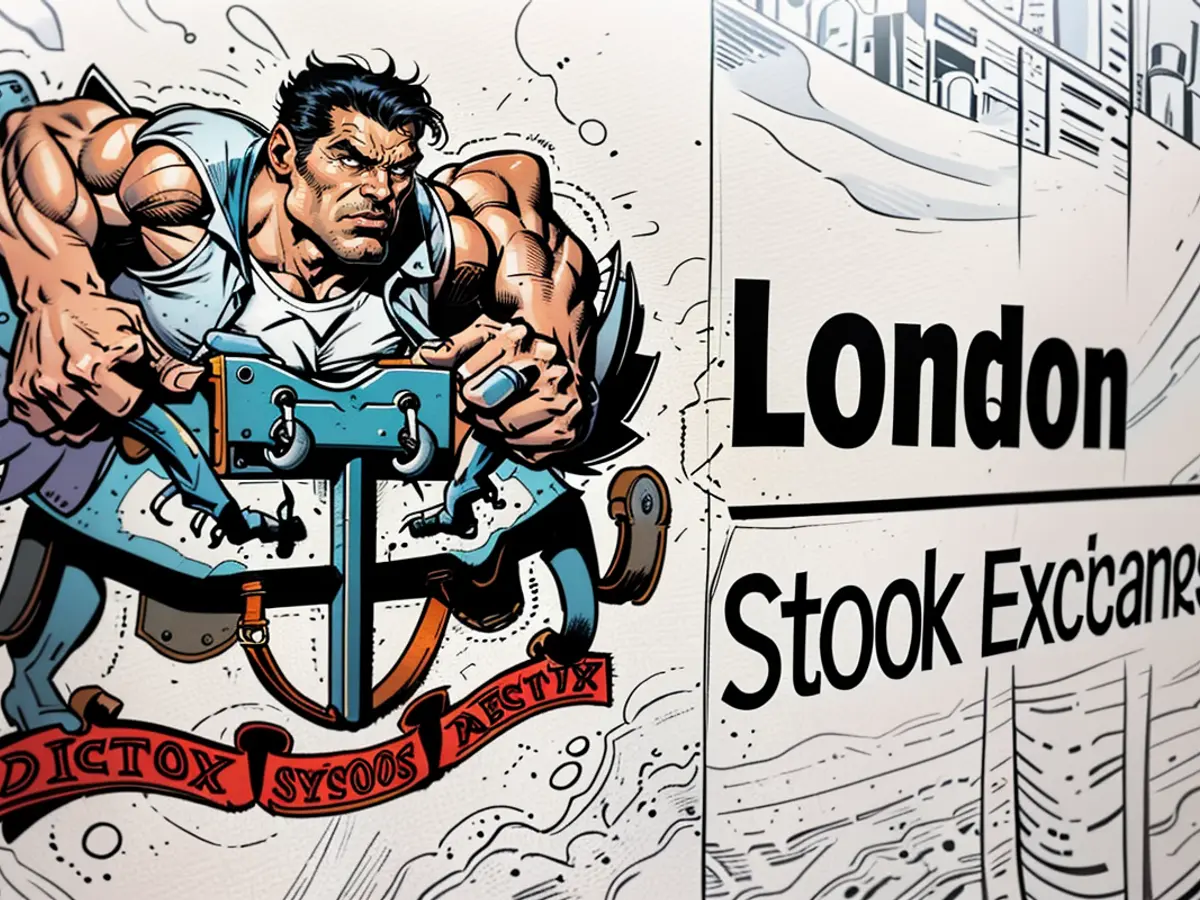UK Stock Market's Current State Revealed
Investors are currently predominantly focusing on technology stocks listed on Wall Street. However, it might be worth considering resource stocks, particularly those listed on the London Stock Exchange (LSE).
In the past few months, the "Magnificent 7" - the seven biggest American tech companies, namely Alphabet, Amazon, Apple, Meta, Microsoft, Nvidia, and Tesla - have driven the S&P 500 to new heights. However, there may be a correction. The LSE has a good chance of surpassing Wall Street in the near future.
Firstly, the LSE offers a more favorable valuation compared to Wall Street. The FTSE 100, which represents the 100 largest companies in London, currently has a price-to-earnings ratio (P/E) of just 12. Worldwide, stocks are valued on average at 17 times expected earnings. The S&P 500, on the other hand, has a P/E of 21. The LSE is typically undervalued, but there are other factors that suggest prices will rise in the coming months.
For instance, resource stocks are relatively heavily weighted on the LSE, accounting for around 25-30% of certain indices. While the mining companies themselves are not based in the UK, they are still listed there. In contrast, resource stocks make up only 6% of the American stock market.
Secondly, resource prices are strongly increasing. The S&P 500 has gained around 12% since the start of the year, with Wall Street outperforming most other stock exchanges. However, copper prices have risen by around 17% even more significantly. Copper is essential for the energy transition, since it is used in offshore wind farms and electric cars. There is no energy transition without copper.
Additionally, mining companies have not invested enough in exploration and extraction in recent years, so they are now trying to increase their reserves by acquiring other resource companies. Between January and May alone, there were takeover offers worth a total of £60 billion at the LSE - much more than in the entire previous year. The average bid premium was around 30%. For example, the BHP Group wanted to buy Anglo American for £37 billion, although this deal has not yet been completed. This indicates the current attractiveness of the sector.
Thirdly, structurally higher inflation is supporting demand for precious metals like gold and silver. Gold has risen by about as much as the S&P 500 since the start of the year, while silver has doubled. In the US, inflation has been around 3 percentage points, while the Fed is still far from its inflation target of 2%. In the Eurozone, inflation has risen again from 2.4 to 2.6% in May. Precious metals, particularly gold and silver, are traditionally viewed as a buffer against risks such as inflation and geopolitical conflicts.
Fourthly, higher inflation also means higher interest rates. These are nothing more than the price of borrowed money. After years of extremely low interest rates following the financial crisis in 2008, they have now normalized, which is good news for banks as they earn more money with higher interest rates. The LSE is also home to a significant portion of the financial sector, so it's a win-win for the LSE.
Fifthly, there are signs that consumer spending in the UK is recovering. British consumers' mood was particularly dampened in 2021 due to rising housing costs and overall rising inflation, even more so than during the financial crisis of 2008-2009 or the Corona pandemic at the beginning of the 20s. Now, however, British consumers' mood has improved just as quickly. This is because wages are increasing faster than inflation. British consumers thus have more real money in their pockets.
Finally, investors with liquid assets of around €25,000 should consider investing 40-60% in stocks. The LSE should play a significant role in this regard. Additionally, they should allocate 5-10% to gold as a protection against risks like inflation and geopolitical conflicts. Lastly, they should keep 10% in cash to take advantage of lower stock or gold prices. The remaining capital should be invested in bonds of reliable issuers.
Disclaimer: Michael Wittek is the portfolio manager at the independent asset manager Albrecht, Kitta & Co. in Hamburg and is responsible for the investment strategy. This text serves solely for information purposes and is for the recipient's use. It does not constitute an offer or invitation to buy or sell securities or investment funds on behalf of or on behalf of Albrecht, Kitta & Co. Asset Management GmbH. The information presented here was obtained from sources considered reliable; however, Albrecht, Kitta & Co. Asset Management GmbH does not guarantee their reliability and completeness and disclaims any liability for losses resulting from the use of these data.

Read also:
- Despite the focus on technology stocks on Wall Street, it's worth considering resource stocks listed on the London Stock Exchange (LSE), such as precious metals companies.
- The London Stock Exchange (LSE) has a more favorable valuation compared to Wall Street, with a lower price-to-earnings ratio (P/E) for the FTSE 100.
- Many resource stocks are heavily weighted on the LSE, accounting for around 25-30% of certain indices, despite not being based in the UK.
- Copper prices have risen significantly more than the S&P 500, making resource stocks like mining companies attractive for investors.
- The Federal Reserve (Fed) in the US is still far from its inflation target, which is supporting demand for precious metals like gold and silver on the LSE.
- British consumers' mood has improved, leading to increased spending and a potential recovery in the UK economy, which could benefit LSE-listed companies.
- Investors with liquid assets might consider allocating a portion of their portfolio to stocks on the LSE, particularly precious metals as a buffer against inflation and geopolitical conflicts.
- The London Stock Exchange (LSE) has a significant financial sector, making it attractive for investors as interest rates increase to normal levels due to higher inflation.







